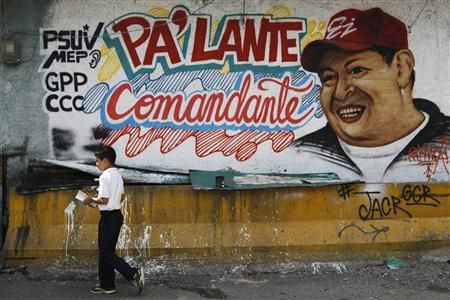Venezuela’s Weird Inauguration Day Has Arrived, But Chávez Has Not

As Venezuelan President-elect Hugo Chávez remains hospitalized in Havana, regional leaders are arriving in Caracas Thursday to attend a unique transition of power involving a constitutional dilemma only slightly ameliorated by an unsurprising last-minute high court decision allowing the ailing leader to be sworn into office later.
Less a presidential inauguration and more a celebration of a continued incumbency, the president-elect’s most loyal constituents – known as Chávistas – will don their own home-made presidential sashes in symbolic act summed up by the comments made by National Assembly leader Diosdado Cabello on Wednesday.
“Anyone who has a sash, bring it along, because tomorrow the people will be invested as president of the republic, because the people are Chávez,” Diosdado Cabello, the president of the National Assembly, said Wednesday at a public rally, according to the New York Times. “All of us here are Chávez, the people in the street are Chávez, the lady who cooks is Chávez, the comrade who works as a watchman is Chávez, the soldier is Chávez, the woman is Chávez, the farmer is Chávez, the worker is Chávez; we’re all Chávez.”
But Venezuelans who aren’t Chávez (literally or symbolically) have decried a ruling on Wednesday by the pro- Chávez Supreme Tribunal of Justice, declaring that since the ailing leader was an incumbent, he never stopped being president and therefore doesn’t need to take the oath on Jan. 10 as stipulated by the country’s Constitution. A day earlier National Assembly Speaker Diosdado Cabello announced that lawmakers would give Chávez “all the time he needs to recover and return to Venezuela,” according to the local El Universal newspaper. Vice President Nicolas Maduro is handling day-to-day operations.
Cecilia Sosa, a former head of the Venezuelan high court, said on CNN Wednesday evening that she considers the court’s decision unconstitutional and that Cabello, not Maduro, is supposed to be the head of the caretaker government, suggesting that Chávez’s choice of his vice president suggests a rift between the Chávistas and other member of Venezuela’s left.
But the opposition Unified Democratic Panel alliance said they would appeal the court’s decision to allow Chávez to remain in power in absentia indefinitely, and take their complaints to the Organization of American States (OAS) and Mercosur to force the government to at least name Speaker Cabello as interim president.
Hours before the start of inauguration day, center-right Governor of Miranda state Henrique Capriles held a press conference decrying Chávez’s ruling United Socialist Party of Venezuela of intimidating opponents. He also pointed out that only a small number of Latin American presidents were attending what he called a political act.
Henrique Capriles, who lost to Chavez in October's presidential vote, implored regional leaders not to attend today’s ceremony.
Nicaraguan President Daniel Ortega, Uruguayan President Jose Mujica and Bolivian President Evo Morales and are among state leaders or ministers attending.
Chávez is reportedly suffering complications linked to his fourth surgery in Havana on Dec. 11 for an undisclosed form of cancer around the pelvic area. Last week a high-ranking delegation traveled to Havana that included two ministers, the assembly speaker and family members.
© Copyright IBTimes 2025. All rights reserved.






















